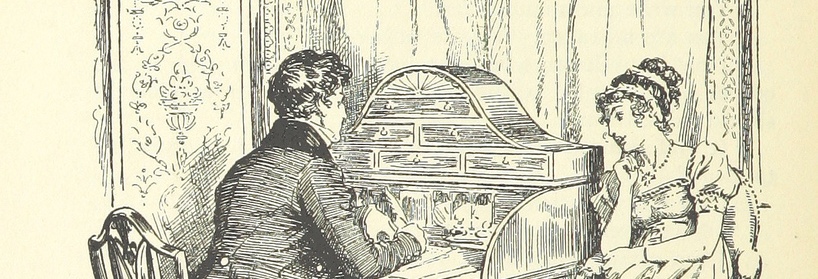The idea: to translate Jane Austen’s comedies of manners into useful instruction in the finding and keeping of employment.
Background: I’ve been an avid reader and/or viewer of Jane Austen novels and/or movies since I was a teenager. My first Jane Austen novel was Pride and Prejudice, read it in one setting, as I was mentally, physically, and emotionally unable to put it down.
As a teenager/young adult, I also read a steady steam of job search articles and books about surviving job interviews. I knew all of the ins and outs, the whys and wherefores, and the dos and don’ts. I was well-schooled in the art of looking for a job. But I still dreaded interviews because I never felt prepared.
Then one day, while waiting in my car to go into a job interview, I was mulling over the standard tips I’d gleaned over the years. They seemed cold and lifeless sitting on the page or glaring at you from the computer screen. And, as I sat in my car in the few minutes before having to go in to face the “hiring squad,” I gave those familiar tips a slight tweak—the Jane Austen treatment, if you will—and suddenly they came to life. They became useful. They became memorable. They became fun.
And now I’m (re)sharing them with you. (Editor’s note: these articles were originally published on this blog May-October 2014)
What’s Your Worst Quality, Mr. Bingley?
If answering the questions “What’s your worst quality?” or “What’s your biggest weakness?” sends chills down your spine, read what Mr. Bingley did. You’ll never be stumped again. Read more here.

Don’t Bad-Mouth Your Former Boss, Wickham
When a potential employer asks, “Who was your worst boss?” he/she’s not inviting you to vent. Discover a better way to respond to this question by reviewing Wickham’s epic fail. Read more here.

Become a World-Class Networker (Like Mrs. Bennet)
This is probably the one and only time it is okay to make Mrs. Bennet your role-model. When it came to networking, the girl had skills! Read more here.

Dress For Success, Elizabeth
Miss Elizabeth Bennet may have had fine, bright eyes, but did her petticoats drenched in mud really send the right message? Read more here.

Tell Me About Yourself, Lady Catherine
Learn how to deal with this ice-breaker from none other than Lady Catherine de Bourgh herself. Read more here.

You Can Never Be Too Thankful…Just Ask Mr. Collins
Mr. Collins was nothing if not overflowing with gratitude. Take a page from his book (just don’t overdo it). Read more here.

Does anyone else find it highly ironic that a bunch of people who (with the exception of Wickham) never worked a day in their lives could instruct one about job interviews?

Nevertheless, this is what’s worked for me. What are some of the ways you make a boring, unpleasant task a tad more tolerable?
And finally, do I promise this is the last time I will write about Jane Austen? I’m sorry, I cannot make that promise.


